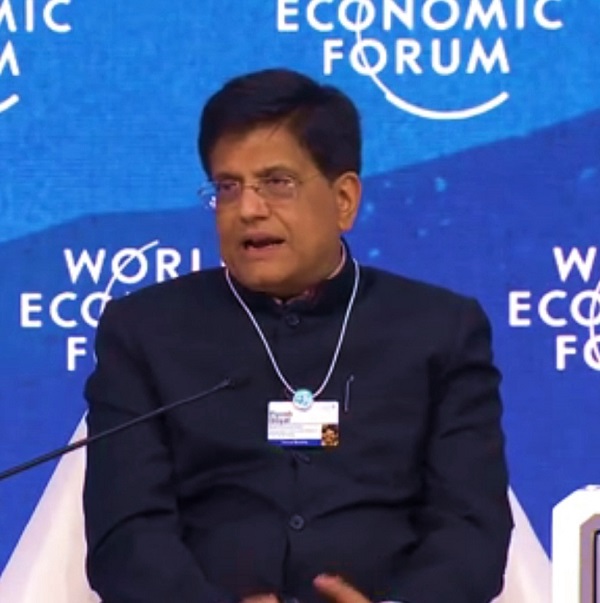New Delhi, (Asian independent) To mark its presence robustly at the just-concluded World Economic Forums (WEF) annual meeting this year, India had sent a record delegation this year led by Indian Commerce and Industry Minister Piyush Goyal.
The meeting took place in Davos from May 23-25.
This year coincides with the World Economic Forum’s 50th anniversary and 35 years of the Forum’s collaboration with India.
Speaking at the WEF, Goyal said, even as challenges continue to remain on economic front, the government is conscious to move forward and is aware of what to focus on. He said there is a lot of optimism globally regarding India.
Goyal also expressed concern over “excessive dependence” on international supply chains and asked businesses to procure locally “whenever there is an opportunity”.
He also mentioned that India has no plans to immediately lift ban on wheat export. India is now the second largest wheat producer in the whole world. But it had put a ban on private overseas sales as output was hit due to heat wave and domestic price hit a record high.
Nearly 100 participants and dozens of political leaders from India attended the World Economic Forum, and presented the country’s position on the energy situation, food security and health equity at Davos.
In line with the Centre’s priorities, sessions were organised at the India Lounge keeping in mind India’s strategic advantage, existing and upcoming incentive architecture, industry investment potential and market opportunity.
The key topics which were discussed during the sessions include policy and ease of doing business reforms, energy transition, digital economy, opportunities in National Monetization Pipeline, India as an entrepreneurial destination shaping the unicorn story, growing talents in the digital space, emphasis on innovation and research in the healthcare ecosystem.
Attendance from China, Japan and South Korea was sparse this year, mentioned Indian industrialist Gautam Adani, Chairman of Adani Group.
It was an opportune forum for India as European business leaders were eagerly scouting options for diversifying trade and investments. Thanks to its political stability and reformist policies, India seemed to have appeared to be the best option for most of them.
Many global investors endorsed India’s rising economic relevance. For example, Saint Gobain Global CEO Benoit Bazin said that the company plans to invest over Rs 5,500 crore in the next four years in India. Bazin was bullish about the 45-billion-euro company’s growth story in India.
David Rubenstein, co-founder of the private equity Carlyle Group, told reporters in Davos that “India has been more attractive (to buy assets) of late than China”. Clearly, India benefitted from the absence of China and concerns over its heavy-handed �zero Covid’ strategy.
Goyal said that every Indian diplomatic mission had been given the responsibility of supporting Indian industry. “Every mission, every office, every official is now ready to stand for Indian businesses and that is what will spearhead Trade 4.0,” he said.
Ministers from several state governments, including Tamil Nadu, Maharashtra, Telangana, Andhra Pradesh and Madhya Pradesh, were also in Davos to attract global investors.
Andhra Pradesh reportedly signed renewables investment pacts cumulatively worth about Rs 1,600 crore with three companies. The investment commitments were made with India’s Adani Green Energy, GIC-backed Greenko and India’s Aurobindo Realty & Infrastructure.
The Maharashtra delegation reportedly signed at least 23 MoUs worth Rs 30,000 crore. Of these investments, more than 55 per cent are by way of FDI from the US, Singapore, Indonesia and Japan.
Indian delegation also included unicorn founders such as Zerodha’s Nikhil Kamath, EaseMyTrip’s Prashant Pitti, Ashish Singhal of Coinswitch, and Vidit Atrey of Meesho.








